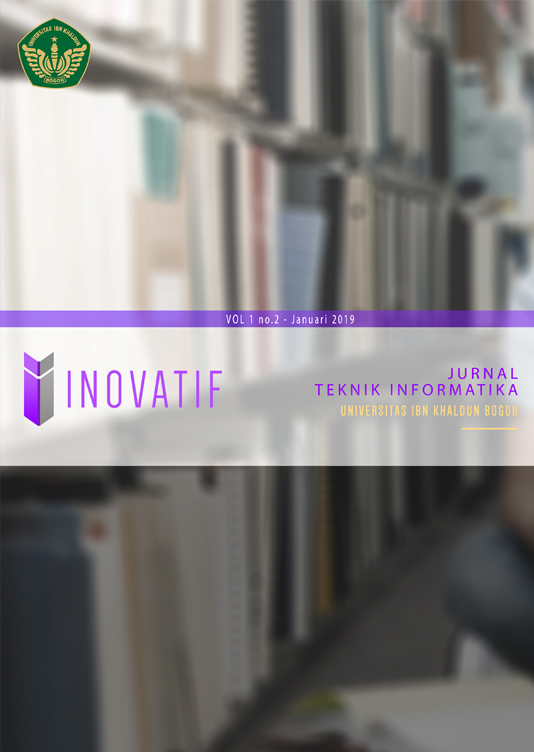Ecotourism As An Lbs-Android Based Tour Guide System Using An Audio Qr Code
DOI:
https://doi.org/10.32832/inova-tif.v5i1.8288Abstrak
Indonesia is a country that is rich in diversity and has a diversity of cultures, religions, ethnicities, races, and natural beauty. One of the sectors that can boost the country's foreign exchange is tourism. In general, the tourism sector in Indonesia is still hidden and needs more development, this can be done by collaborating between the government and the community in improving the facilities and quality of tourism places. Law Number 10 of 2009 concerning Tourism explains that the freedom to travel and use free time in the form of traveling is part of human rights. One form of technological development is the Global Positioning System (GPS) technology which allows the development of Location Based Service (LBS). The emergence of printed information media is considered less effective in disseminating information. Therefore, there is a need for encouragement to be able to recognize tourist attractions that are still not widely known by tourists. From some of the literature that the author has reviewed, there are several similar applications to the topic of the researcher. The eCotourism application is a mobile-based tour guide system application that can help tourists. This application that distinguishes it is an application that uses location based services (LBS) by utilizing an audio QR Code to accompany tourists on their trips. In other words, tourists have an electronic tour guide to guide tourists, especially those in the city of Bogor for tours.
Referensi
A. A. Rahma, "Potensi Sumber Daya Alam dalam Mengembangkan Sektor Pariwisata Di Indonesia,” J. Nas. Pariwisata, vol. 12, no. 1, p. 1, 2020, doi: 10.22146/jnp.52178.
I. R. Setiawan, "Pengembangan Sumber Daya Manusia di Bidang Pariwisata: Perspektif Potensi Wisata Daerah Berkembang,” J. Penelit. Manaj. Terap., vol. 1, no. 1, pp. 23–35, 2016, [Online].
W. Paramarta, J. I. Gede, and P. Ariana, "Peran Undang – Undang Nomor 10 Tahun 2009 Tentang Kepariwisataan Dalam Perlindungan Dan Pelestarian Objek Wisata,” vol. 2009, no. 3, p. 5, 2009, [Online].
L. Mangifera, M. Isa, and M. F. Wajdi, "Faktor-Faktor yang Mempengaruhi Konsumen Dalam Pemilihan Kuliner di Kawasan Wisata Alam Kemuning,” J. Manaj. Dayasaing, vol. 20, no. 1, 2018, doi: 10.23917/dayasaing.v20i1.6415.
M. Sukmaratri, "Kajian Pola Pergerakan Wisatawan Di Objek Wisata Alam Kabupaten Malang,” J. Pariwisata Pesona, vol. 3, no. 1, pp. 33–45, 2018, doi: 10.26905/jpp.v3i1.2048.
B. Mulyana, "Pengembangan Kota Bogor Sebagai Destinasi Pariwisata Internasional,” J. Ilm. Pariwisata, vol. 2, no. 1, pp. 1–12, 2012.
B. Supriadi, "Kompetensi Pendampingan Pemandu Wisata Lokal Sebagai Developers of People,” J. Pariwisata Pesona, vol. 1, no. 2, pp. 72–86, 2016, doi: 10.26905/jpp.v1i2.517.
R. Arianto and A. W. Utama, "Aplikasi Mobile Titik Sebar Rumah Sakit Di Kabupaten Bekasi Menggunakan Location Based Service ( Lbs ) Berbasis Android,” vol. 5, no. 1, pp. 62–71, 2020.
Badan Pusat Statistik, Statistik Telekomunikasi Indonesi 2020. Badan Pusat Statistik, 2020.
K. Setiawan, dkk, "Perancangan Buku Media Informasi Wisata Alam,” vol. 7, no. 2, pp. 1338–1347, 2020.
M. Habibullah, Y. Mulyanto, and N. D. Sofya, "Rancang Bangun Aplikasi Pemandu Wisata Museum Sumbawa Berbasis Android Dengan Memanfaatkan Quick Response Code (Qr Code),” J. Inform. Teknol. dan Sains, vol. 2, no. 2, pp. 136–145, 2020, doi: 10.51401/jinteks.v2i2.596.





















